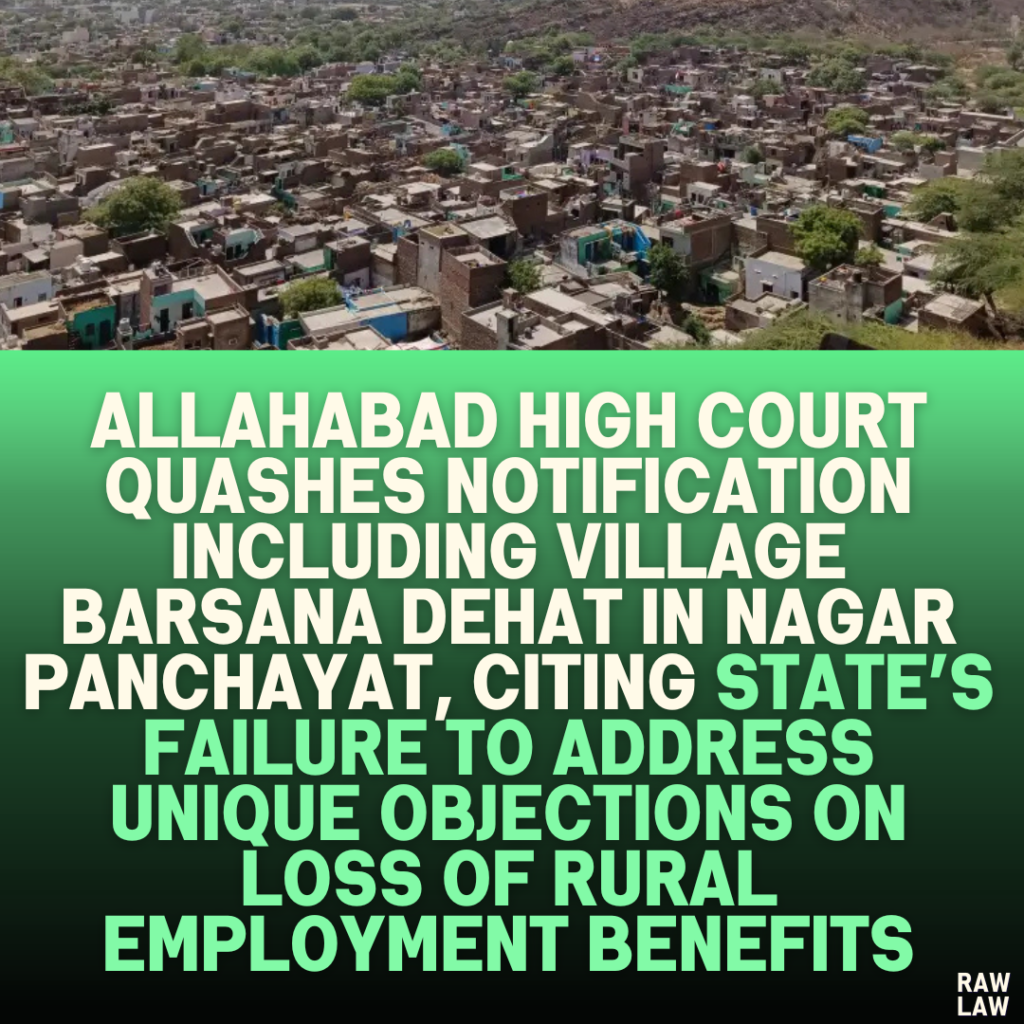Court’s Decision: The Allahabad High Court quashed the notification dated October 13, 2022, issued by the State Government, which included Village Barsana Dehat in the transitional area of Nagar Panchayat Barsana. The Court found that the objections submitted by the petitioners were not considered, a violation of Section 4 of the Uttar Pradesh Municipalities Act, 1916. Consequently, the impugned notification and related order from September 20, 2022, concerning the inclusion of Barsana Dehat were set aside.
Facts: The petitioner, Gram Panchayat Barsana Dehat, objected to the inclusion of their area in Nagar Panchayat Barsana, arguing that the transformation would disrupt local benefits under rural schemes like MNREGA and impose new tax burdens. The State’s draft notification dated September 15, 2022, proposed the inclusion and invited objections within seven days. The petitioner submitted an objection on September 19, 2022, which was acknowledged as received by the State on September 20, 2022, before the final notification was issued on October 13, 2022. The petitioners argued that the objection was ignored.
Issues: The primary issue was whether the State Government violated statutory requirements by failing to consider the petitioners’ timely objections before including Barsana Dehat in the Nagar Panchayat.
Petitioner’s Arguments: The petitioners contended that the State disregarded their objection submitted in time, which included concerns about adverse impacts on local employment, social schemes, and the imposition of additional taxes. They argued this oversight violated Section 4 of the Act, which mandates that all objections be considered before issuing a final notification.
Respondent’s Arguments: The State argued that they did not receive the petitioner’s objection within the stipulated time and contended that the 14 objections they did consider sufficiently covered similar concerns. Hence, they claimed no additional consideration was needed for the petitioners’ specific objection.
Analysis of the Law: Section 4 of the Uttar Pradesh Municipalities Act, 1916, mandates the issuance of a draft notification inviting objections, which must be considered before finalizing any inclusion into a Nagar Panchayat. This requirement ensures due process and community participation in decisions affecting local governance and civic responsibilities.
Precedent Analysis: The Court referenced the case of Sujit Kumar, emphasizing that Section 4 aims to empower the public in local governance. It also examined the case of Narendra Singh Rana, wherein it was observed that natural justice applies, especially where decisions affect civil consequences.
Court’s Reasoning: The Court noted that the petitioner’s objections contained unique concerns, such as the specific reliance of the local populace on rural employment schemes and the potential loss of these benefits if integrated into the Nagar Panchayat. The State’s failure to address the petitioners’ objection separately amounted to a violation of statutory duty. The Court underscored that even when similar objections are raised, each must be individually considered if submitted in accordance with statutory requirements.
Conclusion: The Court concluded that the State’s actions were procedurally flawed and did not comply with the mandate of Section 4. It held that the notification could not be sustained and set it aside with respect to Village Barsana Dehat.
Implications: This ruling emphasizes the legal obligation of government bodies to adhere to statutory processes, particularly in matters that have significant social and economic impacts on local communities. It reinforces the right of citizens to have their objections considered in governance matters that affect their livelihoods and social benefits.



